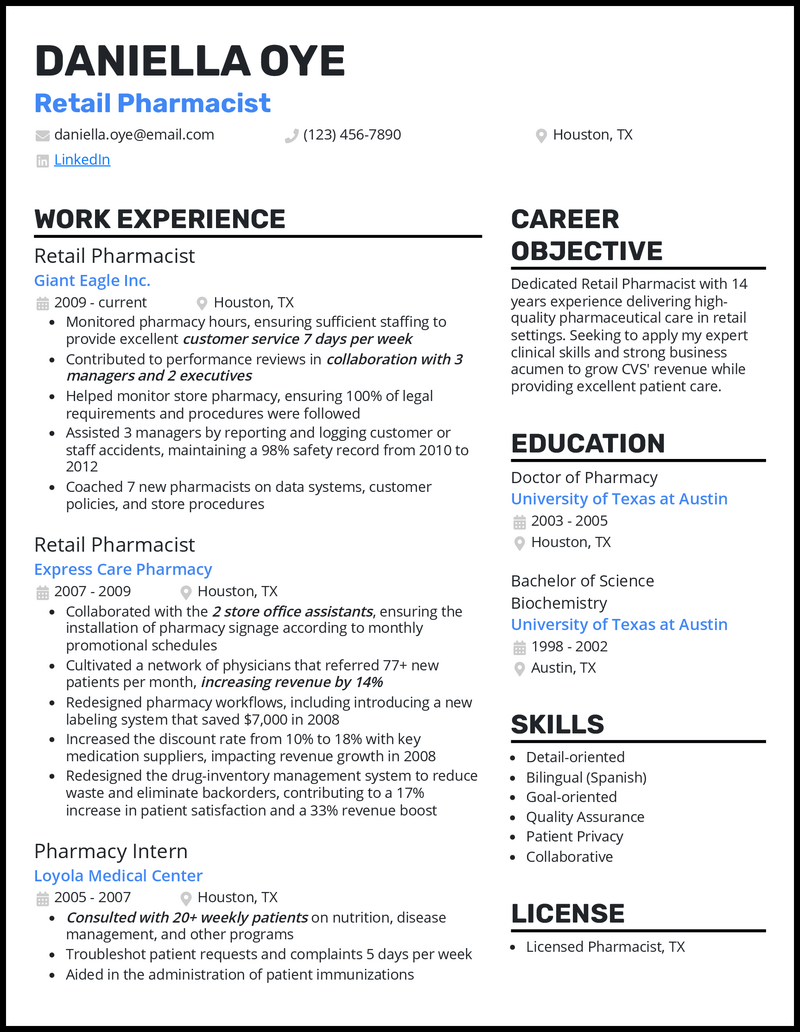As a retail pharmacist, your knowledge of healthcare spans far and wide, but your customer service is no slouch, either. You’ve learned to be adept at counseling, management, and drug dispensing, and you play a key role in helping patients.
With your intimate understanding of pharmaceutics and your stellar interpersonal skills, you’re nothing short of indispensable. However, where do you find a suitable resume template to showcase those skills to recruiters who have never seen your work?
Don’t worry; that’s what we’re here for. Thanks to our retail pharmacist resume examples and tips, plenty of retail pharmacists like you have landed their desired jobs—and so can you.
Why this resume works
- You know what would trigger a flood of interview invitation emails? A retail pharmacist resume emphasizing your impressive (and relevant) educational background that shows you meet or even exceed the minimum requirements for the role and have a solid foundation for key skills.
- For example, if you have a doctorate and a bachelor’s degree, use the reverse-chronological order to list the credentials on your resume, i.e., the former should take the lead in your education section. Of course, adding the name of the school(s) you attended, dates, and location is written in blood.
Related resume examples
What Matters Most: Your Pharmaceutical Skills & Retail Experience

In your job, soft skills play a crucial role, such as your knack for helping patients understand the details of complex medications without being overly technical. Similarly, your compassionate approach is one of the reasons why customers trust your judgment.
Despite how important soft skills are in your daily work, it’s worth focusing primarily on your technical skills in the “skills” part of your resume. You can still highlight some of your interpersonal abilities, but make sure to be specific: avoid vague terms like “problem-solving,” and instead mention directly relevant skills like patient counseling.
Your technical proficiencies will speak for themselves, so be specific when you list them. Highlight your expertise in prescription dispensing or medication therapy management in this section. If you’re a specialist when it comes to vaccinations or a certain class of drugs, also showcase these here.
9 best retail pharmacist skills
- Prescription Dispensing
- Patient Counseling
- Inventory Management
- Regulatory Compliance
- OTC Medication
- Health Screenings
- Drug Utilization Review
- Immunization Delivery
- Drug Interactions
Sample retail pharmacist work experience bullet points
To a recruiter, your skills only paint half the picture of who you are as a professional, and you can fill in the blanks by talking about your impactful work experiences.
Use this section to spotlight your achievements and the way you leveraged your vast pharmaceutical knowledge to get there. Use quantifiable facts and figures to make your experience pop.
For example, you could talk about the number of flu shots you’ve administered and the way you streamlined the patient admission process, resulting in a 19% increase in efficiency.
In the same vein, mentioning that you accurately and safely dispensed prescriptions for over 100 patients a day conveys a much greater impact than simply saying you handled prescription medication.
Here are a few sample bullet points:
- Reduced inventory costs by 10% by fine-tuning inventory management processes and vendor negotiations
- Administered an average of 100 immunizations per week during the peak of the COVID-19 vaccination mass roll-out
- Coached 7 new pharmacists on data systems, customer policies, and store procedures, reducing onboarding time by 28%
- Managed and dispensed prescription and over-the-counter medications for over 100 patients per day, ensuring accuracy and patient safety

How to List Certifications on Your Retail Pharmacist Resume
When you want to show you can handle prescriptions with care and monitor health and safety information, listing relevant certifications on your retail pharmacist resume can help you stand out.
You’d list your certifications below your education with your pharmacy doctorate and skills section on your resume. To format it properly, you should include the following information for each pharmacy certification:
- The certification’s name, such as CPhT or CMI
- The organization you received it from, such as the National Association of Specialty Pharmacy
- The date you received the certification
- The certification’s expiration date (when applicable)

What are the best certifications for a retail pharmacist resume?
The best certifications will depend on the pharmacy you work at and the type of patients you’ll work with. For example, some retail pharmacies may get more elderly patients, so being a certified geriatric pharmacist could be a good fit to stand out.
Here are some of the best options for your retail pharmacist resume:
- Certified Pharmacy Technician (CPhT): Many pharmacists just starting their careers opt to become a CPhT. It’ll showcase many essential skills you’ll use daily, like medication safety, patient care, and medical records analysis.
- Board Certified Cardiology Pharmacist (BCCP): Some patients who come to the retail pharmacy will have cardiovascular conditions like heart disease or irregular rhythms. Knowing how to inform these specialized patients with accurate instructions and answering any questions will help show how you can make an impact.
- Certified Pharmacy Executive Leader (CPEL): When striving for a leadership role in a pharmacy, such as becoming the head retail pharmacist, the CPEL can be a great choice. It’ll showcase abilities in leading pharmacy teams, overseeing inventories, and managing patient care standards.
Some other top certificates for retail pharmacists are:
- Certified Medical Interpreter (CMI)
- Certified Specialty Pharmacist (CSP)
- Board Certified Emergency Medicine Pharmacist (BCEMP)
- Board Certified Pharmacotherapy Specialist (BCPS)
- Board Certified Nutrition Support Pharmacist (BCNSP)
- Board Certified Oncology Pharmacist (BCOP)
- Board Certified Geriatric Pharmacist (BCGP)
Top 5 Tips for Your Retail Pharmacist Resume
- Highlight your certifications
- Pharmacists are required to be licensed, so make sure that you display your NAPLEX (North American Pharmacist Licensure Exam), as well as your state-specific certifications prominently on your resume. The same goes for your degree.
- Spotlight your immunization skills
- People who are certified to deliver immunizations are highly coveted, particularly now as increasingly many vaccinations are being provided by retail pharmacies. If you’re certified to administer shots, include it in your resume.
- Match the job
- Each retail pharmacist role may emphasize different skills. If a job description prioritizes customer service and understanding drug interactions and allergies, make sure you list these skills front and center on your resume.
- Show your pharmaceutical software proficiency
- Using pharmacy software is a large part of a retail pharmacist’s work, so don’t hold back from mentioning the tools and systems you’re familiar with, such as QS/1, Rx30, or Pharmaserv. If you’re experienced with managing patient records or insurance claims, these are worth highlighting, too.
- Get into the specifics
- Throughout your resume, try and refrain from citing any generic skills or experience. Instead of citing a vague “pharmacy techniques,” talk about how you specialize in drug utilization reviews or medication therapy management.
While having some experience in a pharmacy is helpful, it isn’t always necessary. Many major pharmacies have entry-level positions for recent graduates. However, if you have any experience in related areas, such as an internship in a hospital pharmacy, these are worth mentioning.
A retail pharmacist role is predominantly a customer-facing job, so any customer service skills you’ve acquired through your experience will come in handy. However, try to get into the nitty-gritty; for instance, use “patient education” and “conflict de-escalation” instead of just “customer service.”
The golden rule is to aim to fit your resume onto a single page. If you have plenty of experience, prioritize including details of your most recent positions, and simply mention the job titles of older ones if you can fit them.
You can explain more about your best achievements when you generate a cover letter.




![5 Retail Pharmacist Resume Examples [& Templates]](https://beamjobs.wpenginepowered.com/wp-content/uploads/2023/04/retail-pharmacist-standout-resume-example.png)





